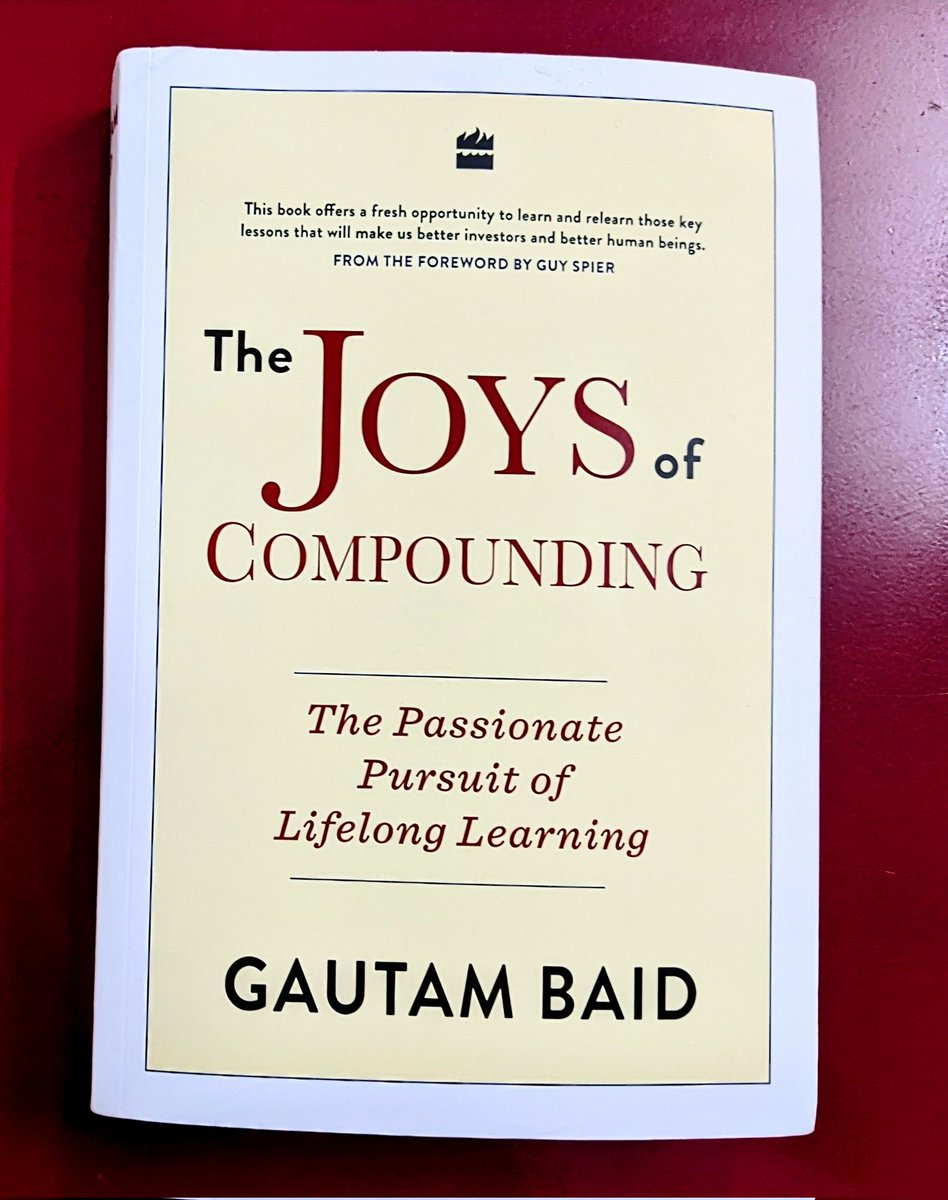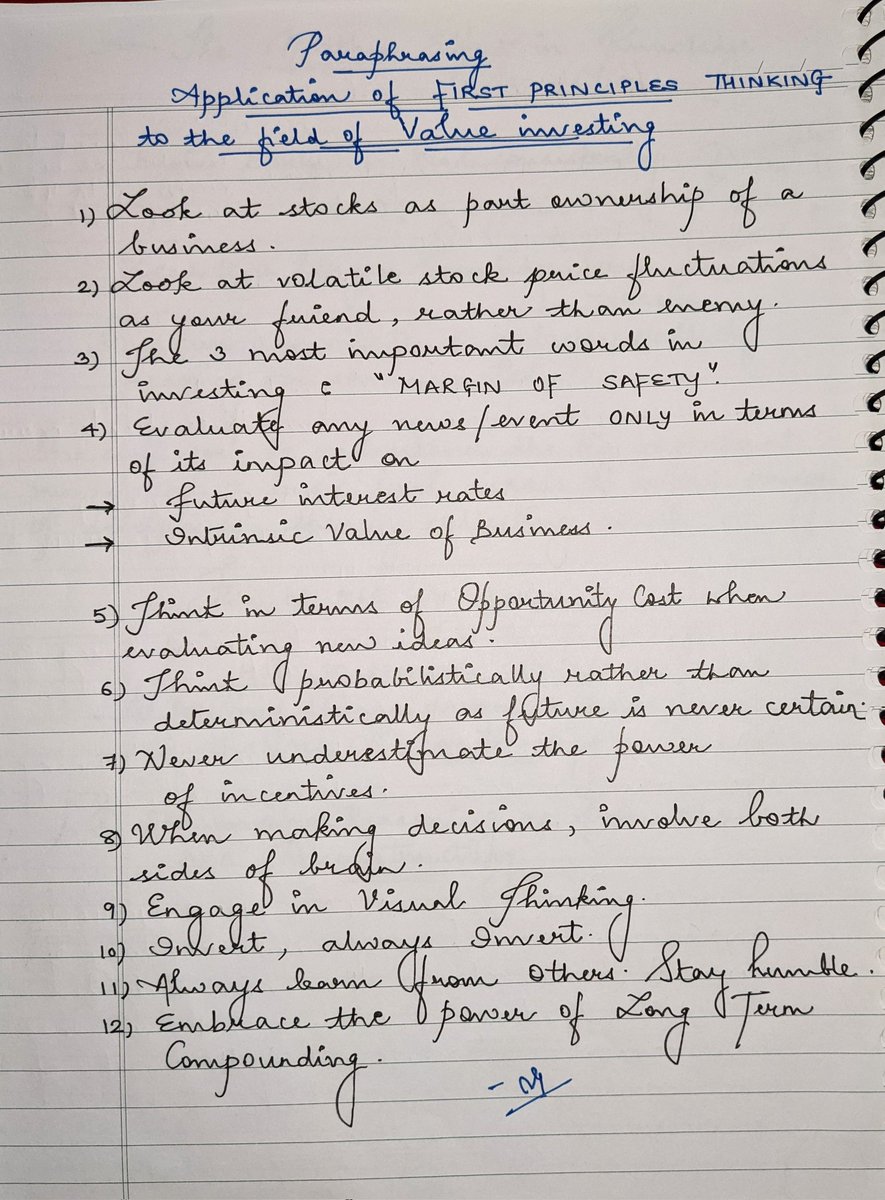
1/20
Sharing some takeaways from the book : India's Money Monarchs* , ONLY of the conversation with Sanjoy Bhattacharya.
* Available on Kindle Unlimited now.
@Vivek_Investor and @dmuthuk
I think you & your followers might like this . 🙂
#BookTwitter
#BookRecommendations
Sharing some takeaways from the book : India's Money Monarchs* , ONLY of the conversation with Sanjoy Bhattacharya.
* Available on Kindle Unlimited now.
@Vivek_Investor and @dmuthuk
I think you & your followers might like this . 🙂
#BookTwitter
#BookRecommendations

2/20
🔸On How to Minimise Risk ?
* Look at long term volatility of Cash Flows ( assuming Financial Statements paint a fair picture )
* Check if business generates Free Cash Flow ( FCF). This ensures company is unlikely to be wiped out at the bottom of the cycle.
🔸On How to Minimise Risk ?
* Look at long term volatility of Cash Flows ( assuming Financial Statements paint a fair picture )
* Check if business generates Free Cash Flow ( FCF). This ensures company is unlikely to be wiped out at the bottom of the cycle.
3/20
🔸Management Integrity matters.
You notice good governance only when it is gone !
Hence unless one has demonstrable proof on a long term basis that people are honest , consider them to be crooks .
Cynical approach but helps save us from losses !
🔸Management Integrity matters.
You notice good governance only when it is gone !
Hence unless one has demonstrable proof on a long term basis that people are honest , consider them to be crooks .
Cynical approach but helps save us from losses !
4/20
🔸 Level of competitive intensity in the business matters. Risk is lower when there are fewer players.
More cut throat the industry , more finesse shall be required and growth shall depend on the ability to adapt and successfully execute.
🔸 Level of competitive intensity in the business matters. Risk is lower when there are fewer players.
More cut throat the industry , more finesse shall be required and growth shall depend on the ability to adapt and successfully execute.
5/20
🔸Try to anticipate what can change in a business .
Scanning the historical precedent or envisaging the future helps .
Inherent risks of business matter !
Sometimes these are completely overlooked & can prove to be extremely expensive.
🔸Try to anticipate what can change in a business .
Scanning the historical precedent or envisaging the future helps .
Inherent risks of business matter !
Sometimes these are completely overlooked & can prove to be extremely expensive.
6/20
Growth At A Reasonable Price ( GARP ) approach seems better suited for India.
Try to find growth and make sure you aren't over paying. ( what is reasonable price in relation to how much growth there is )
P.S : Most Indian investors are momentum based as per the book.
Growth At A Reasonable Price ( GARP ) approach seems better suited for India.
Try to find growth and make sure you aren't over paying. ( what is reasonable price in relation to how much growth there is )
P.S : Most Indian investors are momentum based as per the book.
7/20
🔸Survive to Thrive .
If you don't lose all that you've managed to put together , then you live to fight another day.
All sorts of investors can succeed in markets provided, one has clarity in their approach & realises that NO approach works ALL the time.
🔸Survive to Thrive .
If you don't lose all that you've managed to put together , then you live to fight another day.
All sorts of investors can succeed in markets provided, one has clarity in their approach & realises that NO approach works ALL the time.
8/20
🔸Cap the Risk always & think probabilistically.
Even a 12-15% returns over long term is a good performance.
Don't buy what you don't understand . Keep investing journey simple.
🔸Cap the Risk always & think probabilistically.
Even a 12-15% returns over long term is a good performance.
Don't buy what you don't understand . Keep investing journey simple.
9/20
🔸On Selling
Selling is much tougher because the human mind is not hardwired to do that.
Out of 100books on investing , 99 are on How & When to BUY .
The rationale of How & When to SELL was found in just one book named : When to sell by Justin Mamis.
🔸On Selling
Selling is much tougher because the human mind is not hardwired to do that.
Out of 100books on investing , 99 are on How & When to BUY .
The rationale of How & When to SELL was found in just one book named : When to sell by Justin Mamis.
10/20
People think success in investing comes ONLY from BUYING businesses smartly.
No.
More than half of successful Investing comes from SELLING smart.
It is the dark continent of investing and touches human psychology , an aspect infrequently talked about.
People think success in investing comes ONLY from BUYING businesses smartly.
No.
More than half of successful Investing comes from SELLING smart.
It is the dark continent of investing and touches human psychology , an aspect infrequently talked about.
11/20
To be successful one needs to try and understand the Behavioural Elements of financial markets .
What drives the markets ?
What is the underlying psychology ?
A brilliant book named Judgement Under Uncertainty is recommended to understand more on Behavioural Finance.
To be successful one needs to try and understand the Behavioural Elements of financial markets .
What drives the markets ?
What is the underlying psychology ?
A brilliant book named Judgement Under Uncertainty is recommended to understand more on Behavioural Finance.
12/20
🔸On Time Horizon for Investments
Getting shorter, although one mustn't write off one's bet quickly.
Continuous monitoring is needed as it gives an early warning & allows you to relate what you see & hear from companies to other opportunities of similar nature.
🔸On Time Horizon for Investments
Getting shorter, although one mustn't write off one's bet quickly.
Continuous monitoring is needed as it gives an early warning & allows you to relate what you see & hear from companies to other opportunities of similar nature.
13/20
The BEST committee in investing is a committee of ONE .
One needs to think for oneself.
Independent minded thinking is vital for success.
One needs to learn from past mistakes ,both self & others'.
We often tend to repeat mistakes as we don't pay attention to history.
The BEST committee in investing is a committee of ONE .
One needs to think for oneself.
Independent minded thinking is vital for success.
One needs to learn from past mistakes ,both self & others'.
We often tend to repeat mistakes as we don't pay attention to history.
14/20
At the end of the day , stock selection is the most trivial part of investment process.
It is defining your investment objectives & creating a structure or asset allocation framework that is efficient is of paramount importance.
Tip : Read Book - Winning The Loser's Game
At the end of the day , stock selection is the most trivial part of investment process.
It is defining your investment objectives & creating a structure or asset allocation framework that is efficient is of paramount importance.
Tip : Read Book - Winning The Loser's Game
15/20
1)Figure out YOUR investment objectives
2)How do they fit into the opportunities you have & how you exploit those in terms of committing to them
3)How those opportunities translate into individual investments
1)Figure out YOUR investment objectives
2)How do they fit into the opportunities you have & how you exploit those in terms of committing to them
3)How those opportunities translate into individual investments
16/20
🔸On Valuations
Personally think it's the most overworked thing & people spend too much time on it.
One primarily needs to relate earning power of a business & it's sustainability to the amount of money one is paying today.
Instead folks tinker in excel sheet !
👇
🔸On Valuations
Personally think it's the most overworked thing & people spend too much time on it.
One primarily needs to relate earning power of a business & it's sustainability to the amount of money one is paying today.
Instead folks tinker in excel sheet !
👇

17/20
Investing is mostly about character.
Whatever you do Stick to it ! Don't much around trying a lil' bit of everything !!!
The key to good investing is cutting down the mistakes you make.
Recognise risk - Accept mistake - Trim with discipline.
Everyone makes mistakes !
👇
Investing is mostly about character.
Whatever you do Stick to it ! Don't much around trying a lil' bit of everything !!!
The key to good investing is cutting down the mistakes you make.
Recognise risk - Accept mistake - Trim with discipline.
Everyone makes mistakes !
👇

18/20
What to do ?
* Arrive at a well articulated set of investment objectives
* Have an understanding of the different opportunities available from various investment instruments
* Have a sense of purpose. Choose a method to implement this purpose
* Stick to it ALWAYS.
What to do ?
* Arrive at a well articulated set of investment objectives
* Have an understanding of the different opportunities available from various investment instruments
* Have a sense of purpose. Choose a method to implement this purpose
* Stick to it ALWAYS.
19/20
It shall get difficult with each passing on year to beat markets by a wide margin .
Everyone seems to be using the same tools ,looking at facts the same way.
"There is no single way to skin the cat.Different strokes for different folks - That's the beauty of markets."
It shall get difficult with each passing on year to beat markets by a wide margin .
Everyone seems to be using the same tools ,looking at facts the same way.
"There is no single way to skin the cat.Different strokes for different folks - That's the beauty of markets."
20/20
One can read Sanjoy sir's articles on the website of @FLAMEUniversity ( a brilliant content repository of the thoughts of some great minds of the investing community )
Go to
flame.edu.in
Then go to Home ->Academics -> FIL -> Resources.
* THE END *
One can read Sanjoy sir's articles on the website of @FLAMEUniversity ( a brilliant content repository of the thoughts of some great minds of the investing community )
Go to
flame.edu.in
Then go to Home ->Academics -> FIL -> Resources.
* THE END *
• • •
Missing some Tweet in this thread? You can try to
force a refresh





















